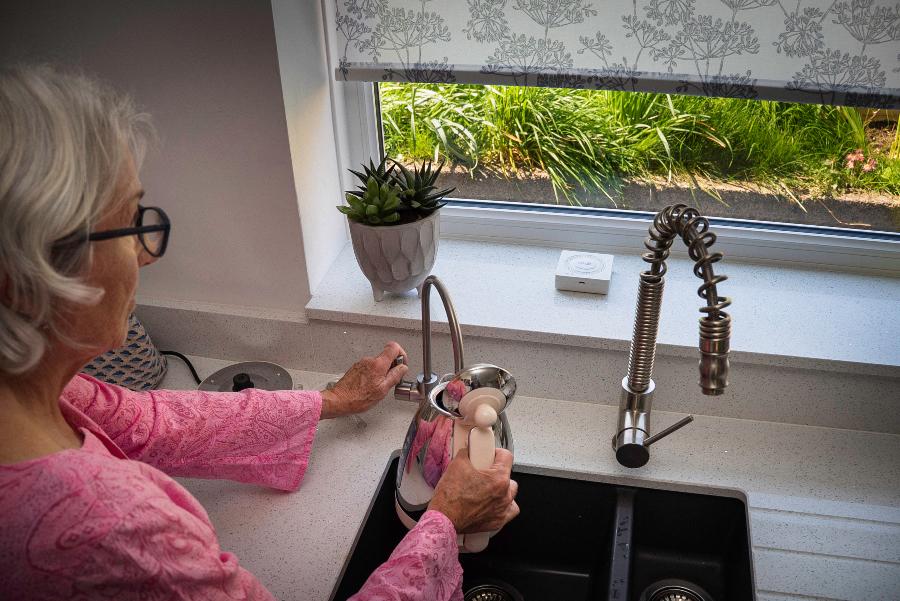AI technology supports independent living by learning daily behaviour patterns of older people
Advanced artificial intelligence (AI) technology is being used in a new telecare monitoring device, launched by personal alarm provider Taking Care, which is designed to help older people live independent lives without compromising on their safety.
Taking Care Sense acts as a preventative measure to help older people to live independently at home. It works by alerting care providers, family members or friends of changes to routine, prompting them to check in on their elderly relative.
The assistive technology device learns the distinct daily routines of users, which then prompts a wellbeing check-in call if any changes are detected.
The routines include monitoring environmental changes, all tracked using AI technology, such as the kettle being boiled, windows being opened and closed, or someone doing the washing up.
Steve Gates, Managing Director at Taking Care, said: “For many, a personal alarm worn around the neck or wrist isn’t for them for various reasons. Taking Care Sense removes that worry.
“By gauging small environmental changes, the technology can monitor their unique daily patterns and raise a check-in call. Above all, it gives much-needed peace of mind and reassurance for loved ones.”
The device is battery powered, with a three-year minimum battery life. This means there is nothing to connect or setup and can the equipment can be left discreetly on a surface in the kitchen.
Providing additional reassurance to an emergency pendant alarm if the pendant button cannot be pressed, the device will flag any declines in tracked activity levels, prompting a quick check-in call by Taking Care’s Resolution Team or a call to a registered close relative or family friend.
Steve continued: “With our team on hand at all times, Taking Care Sense can escalate any potential risks, without the need to press a button or rely on wearing a bracelet or pendant alarm.
“We also appreciate that people worry about their privacy with this type of technology, which is why Taking Care Sense doesn’t use cameras or microphones. Innovation in AI enables us to take away those worries.
“We know that broaching the topic of introducing telecare into the home can be difficult at first, which is why preventative monitoring devices act as a great compromise.
“There’s no requirement for the users to wear a device or action anything, but their families or support systems have the reassurance that steps have been taken to ensure their wellbeing while living at home independently.”
With the cost of living rising, older people at risk of fuel poverty may switch their heating off in colder months to save money, putting themselves in danger. The device senses temperature extremes, so it can also make family members aware if the use of heating is being reduced.
The new solution has been developed by smart technology developer IoT Solutions Group, which worked with Taking Care to combine the device with the personal alarm provider’s monitoring service.
In a recent YouGov survey commissioned by Taking Care, 88 percent of people thought digital technology should be used in the home to help improve the care of an elderly relative to support them in living independently for as long as possible.
However, data also revealed that 54 percent are wary of monitoring technology, such as cameras, while 29 percent are cautious of the use of microphones, and 29 percent deeming them unacceptable to have installed in the home.
Steve added: “We’ve listened to what people want and have responded by launching an innovative new, discreet monitoring solution that doesn’t use microphones or cameras and can help revolutionise care for thousands of older people in their homes.
“Integrating AI technology with telecare is a potential game-changer and will be an instrumental part of introducing preventative, unobtrusive care solutions into the homes of vulnerable older people. This ground-breaking smart technology can now be used to help safeguard older people and empower them to live more independently at home.”
Recently, a new analysis has found that extending telecare services to more people could save the UK’s care providers £14.5 billion by the end of the decade.
The smart monitoring device is available as an add-on to a personal alarm. It is also available standalone, without a personal alarm, from £16 per month, to provide a level of reassurance that a loved one is carrying out their usual routines if they cannot be visited every day.
All monthly subscriptions also include monitoring, with a trained member of Taking Care’s Resolution Team on hand for any potential issues.
Taking Care offers a range of personal alarm products, including pendants, fall detectors and sensors as well as a variety of digital devices.


